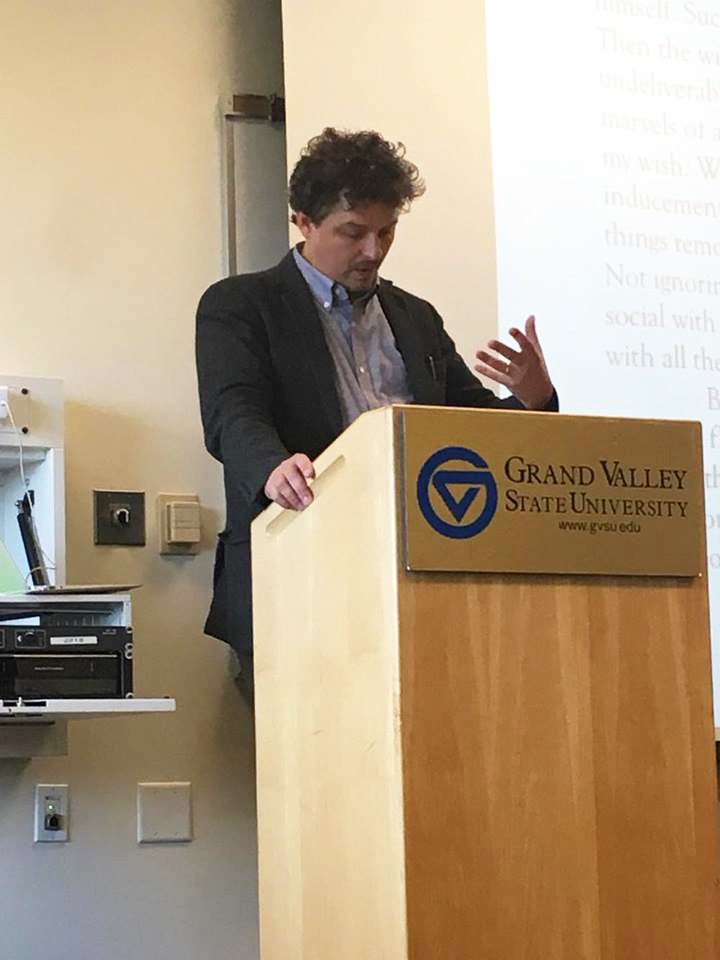Donovan Hohn visits GVSU to kick off annual Writers Series

GVL / Kate Branum Donovan Hohn
Oct 3, 2016
The Grand Valley State University Writers Series has an extensive history of bringing renowned and emerging writers to campus to read excerpts from their work and speak to students about what it takes to make it as a writer today.
Donovan Hohn, former editor at GQ Magazine and author of the book, “Moby Duck,” visited GVSU Thursday, Sept. 29 to kick off this year’s Writers Series.
A crowd of students gathered in the Kirkhof Center to soak up Hohn’s advice about writing.
Hohn is the recipient of the Whiting Writers’ Award, a National Endowment for the Arts creative writing fellowship and a Knight-Wallace fellowship. He has had work appear in Harper’s Magazine, the New York Times and Outside. Hohn now teaches creative writing at Wayne State University.
The lecture began with an explanation of his book, “Moby Duck,” the product of a shipment of toys gone wrong.
A ship left Hong Kong January 10, 1992, carrying over 100 containers of plastic bath toys, including little, yellow ducks. After encountering harsh weather conditions on the North Pacific, the containers were dumped overboard, spilling thousands of toys: 28,800 of them, to be exact.
Hohn was determined to cover the story and began his journey in Sitka, Alaska, where some of the toys had made landfall.
His story appeared in magazines and essays before he eventually expanded it and created a book after spending five years researching and writing.
The lecture wasn’t intended to be a synopsis of his book, rather, Hohn spoke with one goal in mind: to let his audience know the key parts of writing non-fiction stories, or as Hohn prefers to call it, “narrative essay,” without losing the creativity that makes the story interesting.
“The first crucial element of (non-fiction) is a quest. All quests need an object, a grail, a goal, a white whale or an El Dorado. Or, in the case of my book, a haul of plastic ducks,” Hohn said.
Hohn used the work of a few of authors, some of which he had edited at GQ Magazine, to illustrate the points he wanted to make about the “quest-narrative form.” He handed out a packet of paragraphs pulled from books, allowing the audience to follow along.
“As a writer of such narratives, one of your first obligatory tasks is to make your readers share your fascination and your wonderment,” Hohn said. “Make them understand what compelled you to set out on your quest and make them want to set out on it too by reading on.”
All of the stories Hohn selected have a few things in common. They all give readers a clear destination and a goal to accomplish as they read further. When writing non-fiction, it is important to include words and phrases that allow readers to see what the author saw. This sparks curiosity and the desire to know more.
Hohn stated he believed anything can be interesting if written about it in the correct way.
Hohn encouraged each aspiring writer to ask questions often, or better yet, to exit comfort zones and find the answers. Curiosity can often lead to fearlessness, and questions can often push people to search for things they would not normally care about.
Originally, Hohn was not going to set out on a mission to find the ducks. His plan was to tell the story for a magazine at the comfort of his own desk at home. Then, he began writing, and everything changed.
“Sometimes to explain why I fell under the spell of (the story of the toy ducks) I talk about the enchanting incongruity of the images that the (news of the story) brought to mind– images of yellow, childish duckies in the wild,” Hohn said.
Hohn finished his lecture by quoting a passage from the prologue of his novel.
“Questions, I learned since, can be like ocean currents. Wade in a little too far, and it can carry you away. Follow one line of inquiry, and it will lead you to another and another. Spot a yellow duck, dropped atop the seaweed at the tideline, ask yourself where it came from, and the next thing you know, you’re way out at sea, no land in sight,” Hohn said.





















